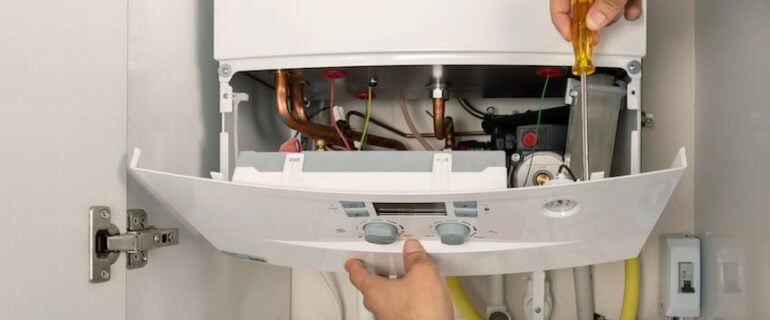If you’re unlucky enough to have a home emergency, like your boiler packing up or rats taking up residence uninvited, finding an expert tradesperson fast and footing the bill might be an expensive headache you’d rather avoid.
If you want your home insurance to cover this type of future event, you could choose home emergency cover as an optional add-on, or as a standalone policy. Before you decide if the extra cost is worth it, make sure you’re clear on what the insurer considers an emergency, and what the standard policy might already cover.
This insurance quote service is powered by Quotezone. The data you supply and submit is collected directly by Quotezone who are responsible for the handling and processing of that data. By using their quote system you are agreeing to their terms and conditions and privacy policy which can be found at Quotezone.co.uk.
What is home emergency cover?
Home emergency cover is insurance for fixing urgent issues in your home, like electrical failure or your central heating packing up.
On a valid claim, the insurer sends out an approved engineer or other contractor as soon as possible to temporarily fix the issue, and will cover the bill for labour, parts and materials, up to a maximum cost. Overnight accommodation for you and your family, up to a maximum cost, may also be included, if it isn’t safe to stay in your home while it’s fixed.
It’s different from a standard home insurance policy, which helps cover the cost of repairing the damage caused by the incident, or replacing belongings, rather than arranging and paying for the call-out to fix the emergency issue itself so it doesn’t get worse.
So, say a pipe bursts and floods your lounge. Emergency cover would kick in to temporarily fix the broken pipe, and offer an overnight hotel stay if your home is uninhabitable. To replace your ruined sofa and floorboards, and for any extensive plumbing repairs needed after the temporary fix, you’d need to make a claim on your home insurance.
What’s considered an emergency?
An emergency is a sudden and unforeseen incident that needs to be fixed as soon as possible because:
- You’ve lost essential services, such as mains drainage, heating, lighting or water.
- Your property has become permanently damaged, dangerous or uninhabitable.
- Your health and wellbeing could be at risk.
Bear in mind that what you consider an emergency may not meet your insurer’s definition. You may think a blocked toilet is pretty urgent, but if you have another one that’s fully functioning, the insurer might respectfully suggest you use that. And while a dripping bathroom tap can be annoying and waste water, it won’t be considered a plumbing emergency.
What does home emergency cover include?
Home emergency cover is about fixing urgent, unexpected problems that affect your living conditions as soon as possible. It usually includes these emergencies, if they happen within your property:
- plumbing and drainage issues
- boiler and central heating breakdown
- electrical failure
- pest infestation, like rats, mice, wasps and hornets
- security issues, like broken front door locks and lost house keys
- roof damage after a storm that exposes your home
If you have a standalone policy, it may offer a higher level of cover than an add-on to your home insurance policy, but it follows that you’ll probably pay more. Check the specifics of each policy before you buy, because the level of cover and the maximum amount paid for a claim varies.
For example, some policies will cover a boiler but not the central heating system, or they may only pay out to repair boilers or heating systems in winter months.
You won’t usually need to pay an excess to make a claim on emergency cover.
What doesn’t home emergency cover include?
Not every emergency or eventuality will be covered by a home emergency cover policy. You won’t usually be covered for:
- Issues caused by lack of maintenance, poor handiwork, faulty design or wear and tear over time.
- Breakdown of appliances like electric showers and air conditioning.
- Faults resulting from hard water scale deposits, sludge or blockages.
- Limitless claims in one policy year, though some policies offer unlimited claims.
- The total cost, if the urgent fix costs more than the maximum claim amount in call-out charges, labour and parts, including VAT.
- Power cuts due to external factors, like the National Grid, or problems with wiring outside of your home.
- Boilers that are older than a specific number of years, or which haven’t been serviced, or which are still covered under warranty. Standalone policies may include an annual boiler service.
- Emergencies that happen within 14 days of a policy start date.
- Properties left unoccupied for over 30 or 60 days in a row, depending on your policy.
- Making repairs beyond the emergency fix, if further work is needed. For that, you’ll need to make a claim on your home insurance.
You’ll usually have access to a dedicated 24-hour helpline to make a claim, and some insurers pledge a response time of just a few hours. However, it can depend on the extent of the damage and other factors like weather conditions. Otherwise, a visit within 24 hours is a reasonable timeframe to expect.If you have a problem with your heating, for example, and the issue can’t be fixed on the call-out because parts are on order, the insurer may send electric heaters to tide you over until they arrive. Home emergency cover isn’t a servicing or maintenance contract. So you need to take care of day-to-day home maintenance jobs, or you risk your claim being rejected.
Do you need home emergency cover?
Home emergency cover isn’t compulsory, but if you’re a homeowner and want reassurance that emergencies could be covered and dealt with fast, it might be worth considering. As a rough guide, call-out fees and rates for plumbers out of hours can set you back over £100, before labour and parts are added.
Before choosing the optional extra, check what’s already included on your home insurance policy. Some standard policies already include a level of home emergency cover, so you won’t want to double-up. Just make sure that the claims cap, for example £200, is enough for what you want it to cover, and bear in mind basic cover may have exclusions for things like pest removal or boiler cover. If you have a packaged current account, home emergency cover may be a benefit that’s included with that.
If you’re renting your home, you won’t need to take out home emergency cover. It’s your landlord’s responsibility to deal with emergency issues and take out any insurance they need.
If you’re a landlord with a network of tradespeople on speed dial you may feel emergency cover isn’t necessary. But if you let out a few properties, the reassurance of that immediate assistance might help take the financial pressure off and help keep tenants safe when something goes wrong, especially if you can’t get there quickly.
Will a claim on home emergency cover affect your no-claims discount?
Whether your no-claims discount (NCD) will be affected depends on the type of home emergency cover you’ve taken out, and the insurer, so the only way to be certain is to read the documents for your particular policy.
Even so, it’s generally the case that:
- If you have a standalone home emergency cover policy that isn’t attached to your home insurance, making a claim shouldn’t affect your home insurance NCD, as they’re not linked.
- If the home emergency cover is included in your standard home insurance policy, and isn’t an optional extra you’ve added, making a claim may affect your NCD.
- If you have home emergency cover as an add-on and make a claim, it may not count as a claim on your main home insurance policy, but again, policies vary.
If you need to make a claim on your buildings insurance or contents insurance for damage caused by the emergency, it will usually affect your NCD.
How to reduce the risk of a home emergency
Emergencies happen, and there’s no guarantee you can avoid them. But keeping your home in a good state of repair and carrying out routine maintenance might help reduce the risk and increase your chances of your claim being paid by the insurer.
Here are a few general home maintenance steps worth taking:
- Get your boiler serviced annually by a Gas Safe registered engineer, ideally in the summer months. This will check that it’s safe and working efficiently ahead of winter, and spot issues that need attention before they get worse. When necessary, bleed your radiators and repressurise your boiler.
- Take preventative action to help stop pipes freezing. When water freezes, it expands, causing pressure to build up. Repair dripping taps and check lagging in pipes and tanks is secure, and know where your stopcock is located, so you can quickly stop the flow of water, if needed. If your home is empty in winter, leave your heating on at regular intervals, for at least an hour a day, and check your policy for any specific requirements.
- Respect your plugholes and don’t put food, coffee grounds, oil and fat down the kitchen sink, as it may cause drainage issues and blockages that lead to plumbing problems. Clear minor blockages before they get worse, and consider keeping a food waste bin near the sink for convenience.
- Don’t flush clumps of hair down the toilet, as it can stick to pipes and build up over time. The same goes for anything that isn’t designed to dissolve, like cotton pads, paper towels and dental floss, which can accumulate and cause blockages.
- Don’t ignore signs of an electrical problem. If your fuse box is making a noise, switches keep tripping, or your lights are flickering, get it checked by a qualified, registered electrician. Keep an eye out for worn cables and cords and discoloration of sockets, and always follow the manufacturer’s instructions when using appliances.
- Inspect your roof regularly for signs of deterioration and dislodged roof shingles or tiles. Maintain gutters so they don’t get clogged, as this can lead to water leaking into your home and down walls. It can also cause pooling, which can create extra weight on your roof. It can even affect the foundations of your home.
- Keep it clean. Rats and mice love an easy snack, so a crumb-free, clean kitchen with spills wiped up, where food is kept sealed and in higher cupboards, and uneaten pet food is cleared away overnight, can help keep your home rodent-free.
Image source: Getty Images

Feel the Fear and Consider Life Insurance Anyway?
Life insurance can stir up difficult feelings that may even be a barrier to getting cover. Understanding why this decision can be emotionally charged might help you to approach it differently.

Life Assurance vs Life Insurance: What’s the Difference?
Life assurance is cover that lasts your whole lifetime, while life insurance usually lasts for a specific period of time. Here’s why that difference matters if you’re thinking of putting that protection in place.

Can You Get Life Insurance with No Medical?
Most people don’t need to have a medical exam to get life insurance. But if the insurer does ask you to have one, it doesn’t necessarily mean you won’t be offered cover.







